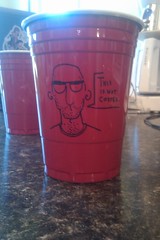Yesterday Uncle Trey, Maybelle, and I made the drive from Cookeville, TN, to Charleston, SC. It's an eight hour drive, which can be a challenge for a three year old.
Guess how many stops we had to make.
 Biffle generously guessed 25. A little hyperbolic, but could have been within the right range.
Biffle generously guessed 25. A little hyperbolic, but could have been within the right range.
But this time the answer is one.
In some tiny town in North Carolina we stopped for lunch at a Waffle House. A tangent: I recognize that it's a bit odd that I could document a month of good times through stories of Waffle House. Trey asked how often we eat at Waffle House during our regular lives, and I said once a week, on average. I get that this is a little much for most folks, but, you know, Maybelle seriously loves her some Waffle House. And she charms the pants off every Waffle House server she's ever interacted with. Her gleeful request for a waffle, and then her hands-in-the-air delight when the waffle arrives--well, that's a high point on the Waffle House shift. I see it once a week on average, and it's a delight for me, too.
At any rate, we made just one stop, and got back to Charleston with such ease that it was sort of astonishing. Maybelle watched two videos on the computer, and she read books, listened to her playlist, sang songs, and whined a minimal amount. Didn't nap at all, and was still easy to get along with.
Trey and I had a series of good conversations, and I got to listen to his podcast, Jawgrind, for the first time ever. If you are a sweet human being with a love of nerds and dedication to Star Trek, you should check out this podcast. I know this applies to several of you reading this blog.
It's now Saturday morning. Not yet 2012, but officially new year's weekend, so we're celebrating. In just a few minutes we're headed out to the beach (because, you know, late December weather in Charleston is 65 degrees), and we're going to soak in every minute of our time together. We'll try to convince Uncle Trey to stay here longer than he was planning to. Strategies: beach time! Biscuits and ham for breakfast! Some sort of fabulous Charleston lunch! Sherlock Holmes tonight on the big screen tv! Hugs from the naked Maybelle! Etc.
I'll let you know how it goes.
12.31.2011
Hey, it's good to be back home again
12.29.2011
More fun stuff
Here she's enjoying our morning exploring the historic train cars at the Cookeville Depot. These were new to me--we got to go inside three separate train cars, sit on things, climb up, look through windows, and say, "Toot toot!" to our hearts' content.
Other fun things:
- The weather is perfect winter: sunny, blue skies, and cold (but not too cold).
- I finished a book that I was reading just for pleasure.
- I've now eaten three Ralph's butter twists.
- I have a wonderful mother who was willing to stay up with Maybelle last night. After mom and I had tag-teamed three hours of lying in bed with an energetically awake Maybelle (7:30-10:30 pm), I let Maybelle come downstairs. By 11:30 I was too tired to stay awake any longer. Maybelle? Raring to go. So mom stayed up with her, until she finally fell asleep at 1:00 am.
12.28.2011
A bit of the back story
I'm sharing lots of upbeat holiday stories here, and I'm doing so intentionally. There actually are a lot of ridiculously fun things going on here over the last week--at my parents' house, in my travels with Maybelle and Biffle--and I want to be consciously aware of them. I'm making an effort to pay attention to these hilarious, or pleasant, or comfortable moments.
 I realize, though, that reading this series of posts, someone might be led to believe that my holiday break is nothing but delirious happiness. In fact, if I read these posts, I might well think, "Damn, am I the only person having a hard time over the holidays?"
I realize, though, that reading this series of posts, someone might be led to believe that my holiday break is nothing but delirious happiness. In fact, if I read these posts, I might well think, "Damn, am I the only person having a hard time over the holidays?"
So here's some of the back story: the holidays are rough for me. And I know they're rough for a lot of my friends, too. This is a time for some pretty painful anniversaries--my own anniversary of the seizure that led to the diagnosis of my brain tumor, a best friend's anniversary of her father's death. Right now one of my in-laws is experiencing a medical crisis significant enough that they're probably approaching this as their last Christmas together. That's pretty triggering to me. I'm so, so sad for their family, but I've also had to keep my distance because it's too easy for me to get caught up in the "that could be us!" whirlpool of thought.
I know from other close friends that the holidays are rough even if there's not a life-threatening event or a painful anniversary. One friend said, "My depression is lurking but not yet rearing. Tomorrow may not be so good." My mom shared that in many past holidays, she hasn't realized how anxious she was until her stomach started hurting physically--that this was a normative part of the holiday experience for her.
I've had some core ideas in place this holiday that I've been trying to keep in use:
- My self-care is my top priority.
- It's all experimental.
- It's okay to go with the flow.
- Pay attention to how I'm feeling.
- Keep expectations minimal: one or two goals a day.
- Pay attention to the moments of pleasure.
12.26.2011
Random good-time holiday stuff
My parents' house has been full of people this holiday season, so my dad declared that we were all going to use plastic cups with our names on them (and therefore avoid the dishwasher being continually full of everybody's 27 dirty glasses). He put out a stack of cups and a Sharpie.
Here, on Mary's cup, Wolverine explains, "I'm the best there is at eating nog." On the right side, his claws are snicking out, but I couldn't get them in the picture.
Trey's cup shows an unnamed person who seems to me to be a past (shaved) version of Trey, grouchily proclaiming, "This is not coffee." There were obviously many others, including Spock saying, "This beverage is not logical," and Watson (on my mug) saying, "This bev is elementary." We even had an appearance by David Bowie from Labyrinth saying, "You remind me of the babe."
*Completely unrelated to the cups is our realization this holiday that "as it turns out" is a great time-buyer if you're trying to make up a story. If someone says, "Aaron, tell us a great joke about a sweet potato," then his best bet is to start by saying, "Well, as it turns out..."
12.24.2011
Dance party
Let me tell you, I take this stuff seriously, as this picture taken by Trey will document. I was quite sweaty after each round. I'm not one of these Wii dance competitors who just moves my right arm. No, I am putting my entire body into the dance. Because I love a dance party.
Catherine does, too. In fact, all of us had a really great time.
12.23.2011
Hanging with the nerd herd
 Here was a fun holiday afternoon: hanging out in a coffee shop and meeting up with friends, family, and family and friends of the friends and family. We drank coffee, ate cupcakes, and played telephone pictionary, which included clues like, "Wet boobs and a laptop computer" and "Princess Leia shooting a rectangle."
Here was a fun holiday afternoon: hanging out in a coffee shop and meeting up with friends, family, and family and friends of the friends and family. We drank coffee, ate cupcakes, and played telephone pictionary, which included clues like, "Wet boobs and a laptop computer" and "Princess Leia shooting a rectangle."
One of my big goals for this holiday is to go with the flow, to let go of my habit of scheduling and planning and just see what happens. This afternoon was a great example of that.
12.22.2011
Holiday high points
 One of my top priorities for this holiday was having what is indisputably the world's best donut.
One of my top priorities for this holiday was having what is indisputably the world's best donut.
Let me make sure you all got that: the world's best donut.
A lot of people and businesses in the world have opinions about donuts. People love the hot donuts at Krispy Kreme (those are tasty), and some Northerners swear by Dunkin Donuts. People get weepy over various apple fritters, donuts filled with all kinds of things, etc. That's fine. But they're wrong. Because the world's best donut is a fresh butter twist made at Ralph's Donuts in Cookeville, TN.
Ralph's has been in operation in Cookeville forever. Or, you know, since my parents were in college. Now it's unfortunately not open for 24 hours a day, but it used to be that you could go there on Sunday at 2 in the morning, getting yourself geared up for Monday morning classes by drinking coffee, talking with some of the old timers, and eating a butter twist. I'll make the off the cuff estimate that I spent 20% of my nights in college at Ralph's--a lot of high school, too, but maybe not as much.
So I love and value the Ralph's experience. But even beyond the excellent experience of being there, the donut itself is fantastic. Crispy but not greasy fried on the outside, and the glazing gets all caught up in the twisty part. It really is a funky twist, not just a twirl--they actually turn the donut sort of inside out to give it its shape. The inside is delicious and doughy, but not like a regular donut, where you're thinking, "Good grief, there's so little glaze for so much tasteless white bread!" There's the perfect ratio of glaze to bread in a Ralph's butter twist. And it's real yeasty bread, unlike the Krispy Kremes, where you sort of feel like you're eating greasy air, and then you realize you've eaten too many and you feel sick.
If I had to make a list of the best fried bread deserts, they would be
1. Ralph's butter twist
2. Malasadas from New Bedford, MA (can't remember the name of the restaurant).
3. Funnel cakes from a county fair (really any county fair)
We took Maybelle last night, our first night in Cookeville. Let's say that she didn't yet love the butter twist itself, but she seemed to enjoy the Ralph's experience very much.
12.21.2011
Gatlinburg
I'll give you more information once we've had a bit more time here, but let me say this: There is a pancake house every 15 feet in Gatlinburg, but they all close at 3pm. We arrived in Gatlinburg around 5, having promised a hungry Maybelle that she was going to get pancakes for dinner. She was eager to get out of the car, desperate for a pancake, and we drove and drove and drove.
By 6 we'd made it to Pigeon Forge, which had a Cracker Barrel--halleluia, they serve pancakes all day. So that was our first meal in Gatlinburg.
Then we came back to our hotel room and tried to get Maybelle to go to sleep. By 9 she finally had done so. Now it's early morning, and I'm sitting in the hotel bathroom, blogging a bit in private so that I won't wake Maybelle up.
Our drive yesterday was a lot of fun. I'm not sure yet how to assess this hotel time with a toddler. In a few minutes the free continental breakfast bar downstairs will open, and I'll go get some coffee. That will help me achieve some clarity.
12.20.2011
Holiday updates and one interesting article
I've fallen off on my regular holiday happiness posts, in part because we've been making it through the flu here in our household. After one night of vomiting every 45 minutes and two days of pretty much lying in bed all day, Maybelle is almost back to her normal, curious, energetic self.
Speaking of which, here's an interesting article that Feministing pointed me to. Its main point is
Backing up a child who doesn’t want to be kissed or hugged does not mean that Grandma, or Great Aunt Edna, or Uncle Bob or Cousin Sara are doing anything wrong, but it does demonstrate that touch and play for affection or fun is your child’s choice in all situations.Biffle and I have been intuitively doing this with Maybelle all along. We ask if we can have a kiss, and if she says no, that's totally legitimate. Our families have respected this, as well. I think it's incredibly important that Maybelle learns that it's her body.
I've also given her some information that's perhaps confusing--the other day, when she was fluish and lashed out at me, I said, "Maybelle, you don't hit people unless you really, really need to." I guess we'll have to talk later about what "really, really need to" might mean.
12.16.2011
End of the semester = fun day
 Yesterday Biffle and I had a date. We went out to lunch at Husk, one of the restaurants that makes Charleston a place people visit (Bon Appetit restaurant of the year, etc). It's fantastic. Every bite we took was noteworthy. I won't be like the NYTimes food writer who said things like, "The dish managed to evoke the marshy salinity of the air that rises off the flats of the Cooper River at low tide, as dogs run into the water below the Carolina Yacht Club." As I read the NYTimes piece hanging on the wall at Husk, I observed to Biffle, "If one of my students wrote something like this, I'd say, 'Scale back the drama!'"
Yesterday Biffle and I had a date. We went out to lunch at Husk, one of the restaurants that makes Charleston a place people visit (Bon Appetit restaurant of the year, etc). It's fantastic. Every bite we took was noteworthy. I won't be like the NYTimes food writer who said things like, "The dish managed to evoke the marshy salinity of the air that rises off the flats of the Cooper River at low tide, as dogs run into the water below the Carolina Yacht Club." As I read the NYTimes piece hanging on the wall at Husk, I observed to Biffle, "If one of my students wrote something like this, I'd say, 'Scale back the drama!'"
At any rate, there's our empty table. We had fresh bread with pork butter (nothing better than pork fat to make butter even more delicious), fried green tomatoes, pimiento cheese and ham on toast, greens, fried bologna, and a huge incredibly fresh salad. Here's what I'd write if I were reviewing Husk for the NYTimes: "The fried bologna was so good even Jim Biffle would have liked it." This is quite the compliment, given that Biffle's dad Jim is the kind of guy who has eaten fried bologna on a regular basis throughout his Southern childhood and adulthood.
If Jim Biffle were reviewing Husk for the NYTimes, he'd say, "That bologna was so good it made my tongue slap my brains out."
I don't think Jim would have liked the pimiento cheese.
Last night we went to the Festival of Lights at James Island County Park. Like Husk restaurant, this is one of those things that is worth doing if you come to Charleston. It's this phenomenon of one billion lights hung up in a park, so you can drive through this three mile light show, and you can also walk around, visit Santa, hear a horn quartet playing carols, and ride a carousel. This year Maybelle was big enough that we did, in fact, get out and walk around.
Here's my advice for those of you who haven't yet visited: the marshmallows are really big. If you get a marshmallow stick, burn all the marshmallows to delicious smithereens at one of the fire pits, and eat them all yourself, you're probably going to feel a little sick.
12.14.2011
I'm a feminist because...
Please go visit a tumblr that two of my students created. It's fantastic. They've been a bit astonished at how much attention it's gotten in the 30 hours its been online, but when you go over, you'll see why: it's interesting, the photography is stunning, and the explanations of feminism are smart and clever.
Let me just say right now, I want in!
12.13.2011
Party
And here she's getting her present from Santa. She was a bit terrified of Santa when he came in the room, loudly "Ho ho ho"-ing into the microphone, but when all the other kids went running to see him, so did she. "It's the abject," I said to Walter as I got up to follow her. "She's repelled, but she has to see." This year, for the first time, she seemed to fully understand the notion that the present was hers and that she got to open it.
One of my DSAL/blog friends took these pictures, and now they're on Facebook. I'm still not sure I understand how Facebook works, but if you're my friend and go to my homepage, I think all the pictures from the party that feature me are part of my Facebook photo album. Or something. Thanks, Michelle!
12.10.2011
Sherlock
Here's something else I'm grateful for: recommendations for excellent tv watching. Cate suggested that Biffle and I have a look at a fairly new BBC series called Sherlock. It's a telling of the Sherlock Holmes stories set in contemporary London, but with many many of the other details of the Holmes universe intact.
The back story: Biffle has an almost pathological love for Sherlock Holmes. He has a volume of all Arthur Conan Doyle's writings which he's had since his early teen years. The thing is literally falling apart, and has his marginalia throughout. He rereads the whole book probably once a year, and has quite the memory for the details of the Sherlock Holmes universe.
And my back story: I like adventure-ish tv shows and movies that feature two smart guys who are working together and also kind of flirting with each other.
So we watched the first episode last night and both loved it. They make clever use of technology: often Holmes's observations are typed on the screen (he sees the word "Rache" scratched into the floor and the German definition of the word pops up for a moment), and he constantly uses text messaging. The whole show was exciting, even if (as in the case of Biffle) you have the entire Holmes universe memorized. They know that many in their audience will have read the Doyle stories repeatedly, so they offered playful references for those folks.
Here's the bummer: there aren't a million more episodes for us to download. The first year has, like, three episodes. Then we, along with everybody else who's discovered this series, will have to wait for the BBC to release series 2.
12.08.2011
Final exam
I'm sitting in a classroom, answering emails and taking care of scheduling matters while students sit in rows in front of me, taking a final exam.
This is my little bit of gratitude for the day: I'm grateful to be giving a final exam rather than taking one. I do have to grade them, but grading them isn't stressful, and it doesn't require loads of late-night studying ahead of time. I'm definitely busy this time of year, but it's easier being a professor right now than being a student.
12.07.2011
Feminist gang in the office
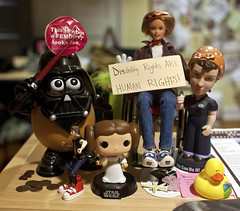 |
| See below for info on this picture. |
Darth Tater's lightsaber has become a placard on which he proudly displays "This is what a FEMINIST looks like" stickers, and Han Solo has discovered that his sexual orientation is more fluid than he'd realized, as he's had meaningful relationships with Darth Tater and Becky--and now Princess Leia has arrived and is making things more complicated for him.
Becky--a Barbie doll who uses a wheelchair--has become a feminist disability activist, carrying signs and sporting a funky short haircut. In fact, she's also now wearing Dutch shoes, a gift from a master's student from Amsterdam who's been studying masculinity at CofC this semester.
All these folks have been gifts, and they often experience paradigm shifts while I'm not around. Many of the WGS students feel comfortable rearranging these folks and having a say in the activist messages they should proclaim. I'm grateful that when you walk in the door to the WGS office, this is the community you meet.
And thank you to Trey for the Princess Leia bobblehead!
And thank you to my student Hannah for taking this great picture of the office gang! The previous picture--a terrible one, taken with my cell phone, can be found here.
12.06.2011
A brief gratitude post
I find I'm feeling fairly unpleasant toward the holidays this year. Driving home today from a visit with my neuro-oncologist at Duke, I decided that I'd like to put a little energy into acknowledging the things I'm grateful for.
So let's start here: the visit with Jim, my neuro-oncologist, went quite well, and I'm grateful for him. He's a good guy who's clear, speaks to me as a human being, and comes into the meeting room carrying nothing. He just sits in a chair and talks to me--no flipping through the chart. He doesn't expect me to sit in the exam chair, and he's fine with us arranging the room in weird ways (for instance, Catherine sat in the exam chair today so that I didn't have to). He also answers my emails and phone calls.
 I'm also grateful for Catherine, who accompanied me on the trip. Check out the presents she managed to squeeze into her luggage and bring in honor of my birthday (even though we'd decided we don't do birthday presents anymore)! There are too many good things to say about Catherine for me to fit them in a blog post, so let me just acknowledge that I'm grateful.
I'm also grateful for Catherine, who accompanied me on the trip. Check out the presents she managed to squeeze into her luggage and bring in honor of my birthday (even though we'd decided we don't do birthday presents anymore)! There are too many good things to say about Catherine for me to fit them in a blog post, so let me just acknowledge that I'm grateful.
Tomorrow I think I'll show you an updated picture of the unruly feminist cohort of toys at my office, something else I'm grateful for.
12.02.2011
Review of The Shape of the Eye
I’m sort of compelled to read new memoirs by parents of kids with disabilities, particularly parents of kids with Down syndrome. It’s an unhealthy compulsion, because my intense frustration with most of these memoirs is so evident that Biffle has often asked me to stop reading them. The other day I was mad for some complete other reason, and Biffle said, “Are you reading a memoir?”
I get angry because the memoir writers often spend much of the memoir detailing their misery: here’s how terrible it is to have a child with Down syndrome. This story is at this point so old it’s clichéd, and it’s not functional in the ways I think these parents ultimately want it to be. They end the memoir at a place of love for their child, and they seem to want the reader to feel that love as well, but what the reader more likely feels is some version of, “I'm glad that’s not my kid. But bless their hearts.”
The Shape of the Eye doesn’t do this.
George Estreich certainly acknowledges profoundly mixed feelings when his daughter Laura was born and diagnosed with Down syndrome. For instance, he writes, “I felt that Laura’s life was valuable, that she was a child, a sister and daughter and granddaughter above all, that she might learn and thrive. I also felt that our lives were over, that her birth was a tragedy, and that we were condemned to a half-life of hospitals, acronyms, therapists, and forms” (xiii). So here’s what he does: he acknowledges this emotional place of paradox, and then he launches into a thoughtful reflection (even analysis, although I get that this word doesn’t turn other people on the way it does me) about how he and his family create meaning and love in the midst of a culture that, by and large, doesn’t do particularly well with disabilities, particularly with cognitive ones.
And he discovers that life with Laura is like life with a child: delightful, challenging, hilarious, frustrating. This is not a book about Laura’s birth being a tragedy. It is, as is true for all memoirs, a book about George Estreich, about his growth, his family heritage, his struggles with depression and his expansion into the role of father/writer/activist.
And what I particularly appreciated is that it’s a book about how we understand Down syndrome, how we talk about it. Estreich (like me!) is critical of many of the familiar stories that are out there, and he notes, “Each time I shared the news, I faced the difficulties of narrative” (26) (interestingly, I was making this very point Wednesday in a lunch with another scholar who studies disability). He actually has lots of good points about the importance of narrative—about the problematic descriptions of kids with Down syndrome as “sweet”: he even calls out the “little angels” description that pisses me off so much.
He writes about his own process of beginning to write about Laura. He does some reading—medical and historical—about Down syndrome and discovers that the way it’s described is often nauseatingly bad: unforgivably inaccurate (one fairly recent medical book describes people with Down syndrome as “trainable”) and offensive. He discovers that “What Down syndrome ‘was’ mattered less than the way it was described” (151).
By the time I got to this part of the book, I knew I’d found an ally, somebody who should come hang out with us at the NDSC Convention (come on, George!), and someone I should talk to about my research into prenatal testing.
I’ve gone through this review resisting the urge to offer tons of quotes from the book, but let me end with this one:
If our technologies are to benefit people with Down syndrome, then their lives need to become more real to us. Science can illuminate one part of that reality, and technology can affect it. But only story can convey it (208).
I completely agree.
Full info about the book: Estreich, George. The Shape of the Eye: Down Syndrome, Family, and the Stories We Inherit. Dallas: Southern Methodist University Press, 2011.
11.24.2011
Sarah Josepha Hale
 We had a follow-up workshop for the OpEd Project at the College of Charleston last week, and it occurred to me during that workshop that I should write an op-ed about Sarah Josepha Hale being largely responsible for making Thanksgiving a national holiday. I'm not the only person who knows about this, but it doesn't seem to get a lot of attention on Thanksgiving anywhere but at Baxter Sez. Wouldn't it be cool if the New York Times or Washington Post had a piece about this forgotten woman?
We had a follow-up workshop for the OpEd Project at the College of Charleston last week, and it occurred to me during that workshop that I should write an op-ed about Sarah Josepha Hale being largely responsible for making Thanksgiving a national holiday. I'm not the only person who knows about this, but it doesn't seem to get a lot of attention on Thanksgiving anywhere but at Baxter Sez. Wouldn't it be cool if the New York Times or Washington Post had a piece about this forgotten woman?
However, things have been busy, so I didn't pull it together to write an op-ed. Maybe next year. For 2011, Hale's going to be on the blog rather than in a newspaper.
Sarah Josepha Hale (1788-1879) is one of the 19th c. women I studied back in the day, when I studied 19th c. women. Hale is responsible for Thanksgiving being a national holiday. As editor of Godey's Lady's Book, hands down the most popular magazine of its time, she was incredibly influential nationally, and she used her influence to argue for things like equal education for women, high-quality American literature, and Thanksgiving.
The United States only had one national holiday at that time: July 4. A lot of people celebrated Thanksgiving, but there wasn't a set day for it, and it wasn't nationally recognized. She lobbied the Presidents for 25 years about this issue, and finally Lincoln complied in 1863. She'd been saying for years that an additional holiday would help bring the country together, and during the Civil War Lincoln saw the symbolic significance of this.
So as you enjoy your day off, eat your turkey or tofurkey, and think about the native people whose land the Puritans stole, raise a glass in honor of Sarah Josepha Hale, who should be a national celebrity on Thanksgiving.
11.22.2011
Check out Psychology Today
Head over to the Psychology Today website and see a post I was invited to write, called "Peter Singer: Espousing lack of human diversity, 20 years and counting." You all have read comments here and there from me about Singer, who is an incredibly important philosopher who's said some incredibly controversial things about human disabilities.
My colleague Jennifer Baker, who's a regular blogger at Psychology Today, wrote a post, and mine is a (sort of) response. Even though I'm articulating some of the "intense vitriol for Singer" which she notes "puzzles me a bit," she was incredibly gracious in her email back-and-forths with me, offering a lot of helpful explanations of the field of philosophy. And I think we do agree on one key point, which is that Singer didn't "cause" a disrespect for Down syndrome--he's voicing things that our culture already believes, and giving them additional credibility because of his status.
Okay, go over there and leave a comment. I think it may be a big conversation.
11.20.2011
Dingaderry
As I may have mentioned here before, Maybelle loves The Wizard of Oz movie. Loves it so much that I could probably recite/sing the movie to you, from Glenda's "Come out, come out, wherever you are!" to the Emerald City dwellers' "That's how we laugh the day away in the merry old land of Oz." (That's as long as she can go--most of the time she only watches from Munchkinland to the rescue of the Tin Man.)
She particularly loves the Scarecrow's song, and she's learning the lyrics and choreography.* All the moves she makes here are imitations of what the Scarecrow is doing. (Keep reading after the video, because I have a story.)
So, at the end of the song, after the Scarecrow has mused about all the things he could do if he had a brain, he sings, "I could dance and be merry, life would be a dingaderry, if I only had a brain."
Here's a conversation Biffle and I had about these lyrics.
Alison: What does that mean, "dingaderry"? What is that?
Biffle: It's just a word they made up. It rhymes and sounds fun.
Alison: Is it a particular kind of dance?
Biffle: No, I think they just made it up.
Alison: Do you have any evidence? Did you look it up on that "Straight Dope" website?
Biffle: No, but I'm 100% certain they made it up.
Alison: But he sings, "dance and be merry, life would be a dingaderry." Is that really what the people writing those lyrics thought was associated with having a brain? That's not what it means to have a brain. If he had a brain, he'd be all analytical, considering everything. He'd be, like, holed up in the library. Nobody thinks that having a brain means life would be a dingaderry.
Biffle: You're really stuck on this. Why do you care?
Alison: Because I have a brain! See--this is exactly what those lyrics are missing! If you have a brain, you think it's fun to stand in the kitchen analyzing the term "dingaderry"!
I thought I had a good point.
*Here's a tangential but related point about how cool the Wizard of Oz movie is. First of all, it has a female protagonist who doesn't ever become anybody's love interest, and she never gets rescued. She becomes part of a community, and they all look out for each other. That's remarkably rare. Second, the diverse (although all white) characters she joins in community with think that they're deficient--they're lacking brains, heart, courage--but in fact they all have those qualities in abundance, they just have to recognize them. So the movie isn't about people with lacks needing to be fixed; it's about funky, interesting folks who have all the qualities they need.
11.17.2011
Lists
Things I want to blog about:
- s.e. smith's post about why she's not a feminist
- George Estreich's book, The Shape of the Eye
- Jen Baker's post over at Psychology Today about the Lucas-like Peter Singer
- Gender identity and kids with cognitive disabilities (i.e. if my job is destabilizing gender norms, then why is it important that Maybelle learn them?)
- The Op Ed Project and how cool it is
Things I want to own:
- a pair of brown corduroy pants
- a pair of dark blue jeans
- running shoes
- three more professional shirts (and if they don't need ironing, all the better)
- black shoes that aren't scuffed all to hell
Things Maybelle says that are cute:
- "So beepy" (so sleepy)
- "No bee-tyou" (no thank you)
- "I want yeah yeah yeah" (a request to play the last several tracks from Abbey Road)
And unrelated to all these lists, go have a look at the additional point Jamie Huff made on my post about "The sentimentalized narrative, or 'God Bless the USA.'"
11.16.2011
NWSA 2011: Thoughts from back in Charleston
You may have noticed that I only had two days of NWSA thoughts, although I was at the conference for four solid days. This is evidence of how busy those four days were. Full from morning until night! So let me provide some highlights from my notebook of observations about the conference, and then we'll move on to other matters on Baxter Sez.
- At one point I wrote, "I never talk about 'methodology' in my writing. I have methodologies, but rarely (never?) do I map them out that way." It seems like all the grad students I saw talked about their methodologies right at the outset.
- There's apparently a children's book called Maybelle the Cable Car by the same author (a woman) who wrote the steam shovel book.
- Rachel Reinke has a colleague who's in WGS and refers to WGS scholars as "professionally offended." This relates to a point I made in the Program Administrators and Directors' pre-conference, where I pointed out Biffle's observation that WGS faculty use the word "appalled" way too much. There's a lot that's appalling, of course, but we don't want to be the field that's universally appalled or professionally offended. I talk about this in my essay in Rethinking Women's and Gender Studies, out in December.
- I had a wonderful date with Sujatha Jesudason and took a page of notes. One note of interest: how is it that talking about prenatal testing makes people think you're pro-life? Sujatha and I are both emphatically in favor of reproductive rights, and both questioning the role of prenatal testing.
- I had an extended conversation with my feminist cohort about fashion--namely, my lack of it. They all know that I hate shopping, and they generally endorsed Biffle's notion that I buy five outfits that are identical and wear them all week. In other words, dress like a man.
- And here's an example of how I'm trying to incorporate self-care into my life: there was a dance party Saturday night, but I was exhausted, so I went back to my room. I missed a dance party! That was a big step for me, and a bit sad. But I was really exhausted.
11.11.2011
NWSA 2011, day 2
Let me tell you about my day, in bullet points and photos:
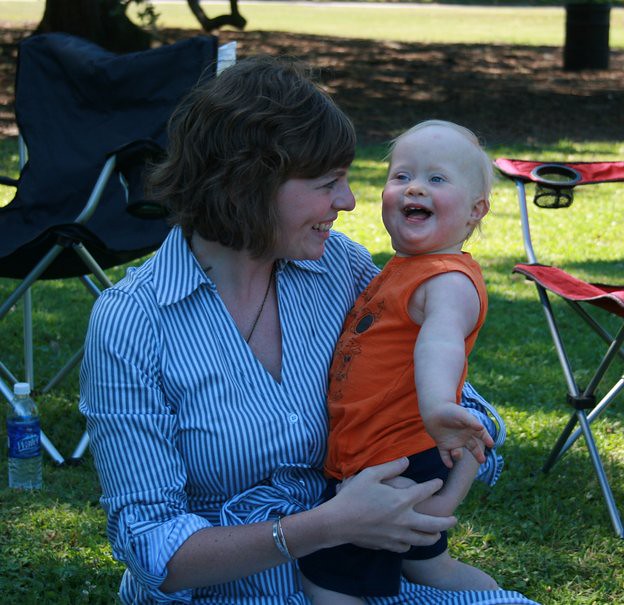
* Have been going 100 mph since 5:30am
* Went to a fun morning panel with presentations by Liz Groeneveld (who is doing great research into zines by girls and women--and quoted me!) and Jessalyn Keller, who's writing a piece for an edited collection that I'm also going to be in.
* Got reconnected with Rachel Reinke. She was amused at how many of my friends knew who she was when I said, "You know, I advised her bachelor's essay AND she was Maybelle's nanny the same year. She came to my house to do bachelor's essay advising after Maybelle went to bed." My friends said, "Oh! Right!"
* Took part in a fun roundtable presentation about blogging, with a bunch of my co-editors at Girl w/Pen. My big insight: I'm able to fit blogging into my already full life because it's really fun. Not all that chewy an insight, but true!
* Had a lengthy conversation with my editor at NYU. We decided that I'll plan to have the full book proposal, including a sample chapter, to her by the end of the summer.
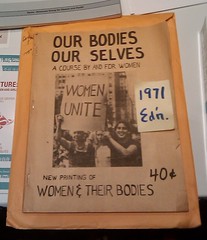 * Had a conversation with my new BFF, Judy Norsigian, one of the original members of the Boston Women's Health Book Collective that did Our Bodies, Ourselves. She seemed a bit surprised when I told her how honored I was to get to talk with her. She took my card!
* Had a conversation with my new BFF, Judy Norsigian, one of the original members of the Boston Women's Health Book Collective that did Our Bodies, Ourselves. She seemed a bit surprised when I told her how honored I was to get to talk with her. She took my card!
* After all that, I went to my room and napped during big afternoon plenary.
* Hung out with the gang at Karlyn's book signing, which was fun.
* Met up with Amanda Richey, a friend from childhood who I now only ever see at NWSA.
* Recognized how extensively I've been talking about the fact that I'm in therapy (well, it's important to my life, plus it's nothing new).
* I'm skipping out of an evening panel session that I was going to go see so that I can have some down time before dinner. I believe that 18 of us are going to dinner together (!!).
And in case you're concerned that maybe feminists aren't as frightening as you've been led to believe, here's a sticker that a major academic press gave me for my nametag:
11.10.2011
Alison's updates from the NWSA
Okay, I've had a great time at Day 1 of NWSA 2011. Here are some things I've learned:
- The US has 5% of the world's population, and 25% of the world's prisoners (this info from fascinating Ruth Gilmore, who is someone my Gender and Violence students will be hearing about).
- Women's and Gender Studies is the ideal liberal arts degree (thanks, Astrid!).
- If you Google "hysterectomy and NWSA," a Baxter Sez post from 2007 is the fifth item on the list (Karlyn gets credit for discovering this, and she'll write a book about it if I gnaw out my own uterus).
11.09.2011
Op ed!
Amber Cantrell and I finally got our op-ed published. We wrote it over the summer and have sent it to, I think, seven newspapers. Persistence pays off!
"Looking anew at Down syndrome" in The State.
11.08.2011
The sentimentalized narrative, or, "God Bless the USA"
Recently my friend from high school who is now a famous blogger, Tracy Moore, sent me an email in which she asked,
Have you seen this video about the kid with autism who makes a basketball hoop? People are posting this like crazy on Facebook lately, and it's one of those posts where everyone is going nuts for how much this "makes their day" and people watch it and comment and say that like anyone who doesn't cry when they see this video is dead inside and other assorted up with people type responses.
But when I watch the video -- it's a basketball game at a high school somewhere where they let this kid with autism shoot some hoops and he "miraculously" makes them and the crowd goes wild with happiness -- it just really makes me think of the conversation you have going on your blog about representations of intellectual disability.
First off, they are crazy hard shots to make, so it'd be cool to watch anyone nail like 18 points at the very last minute of a game. But I guess my problem with the video, as best as I can articulate, is along the lines of what you write about Down Syndrome depictions. If we act like it's some miracle from heaven that a kid with autism can make some baskets, isn't this setting shooting hoops as this really high bar that we are supposed to regard as amazing and rare? When really this probably isn't as exceptional as the video makes it?
Also, I barely know anything about autism aside from a story or two I've reported that relates to it, but I do know that there's a spectrum, and this news story says nothing about that, and just sets up the viewer to believe that this one kid represents "autism." Here is a kid with autism, it says. And that having autism means it's crazy rare to be able to shoot a basket. Intellectual disabilities -- do they always go hand in hand with physical ones? Meaning, is it weird to assume someone with an intellectual disability couldn't be good at basketball? It just seems incongruous to assume so.
Anyway, I'd love to hear your thoughts -- you may have already been sent it, but it'd be great to read your take on it. Maybe something for Baxter Sez if you need it.
I responded:
I've been hearing about that video, but Biffle and I watched it together this morning because of your email, and it represents a problem I've been planning to blog about, what I'm calling the sentimentalized narrative, the story that's "miraculous" or "absolutely amazing," that makes a room full of typical people weep and offer a standing ovation. It's just a version of the standard pity narrative, and it makes me a bit sick to my stomach.
We see versions of this narrative all the time, often--but not always--with sports. I've seen lots of videos of the kid who was the team "manager" who's allowed to suit up on the last day, at the last game, and is allowed to "play," with everybody keeping their hands off and making it all about the "special kid." (Okay, I'm getting weary of my own scare quotes, but you see what I mean). I've seen it with other basketball instances but also football and baseball. Why wasn't that kid allowed some meaningful inclusion during the whole season? This is where the Special Olympics is a nice contrast: those athletes train, work really hard, and compete meaningfully. And with this latest video: if that kid is that good at basketball (making six three-point shots, which seems pretty significant), why wasn't he an actual member of the team?
I saw a different version of this sentimentalized narrative a couple of days ago. A high school senior with an intellectual disability loved to sing, and through some parental maneuverings he got connected to a professional singer who came to the student's high school choral performance, pulled him up on stage with him, and together they sang--are you ready for this?--Lee Greenwood's "God Bless the USA." I'm in a ballroom where this video is shown. The audience of mostly typical adults is gasping. Tears are beginning to flow. I pulled out my cell phone and texted Biffle,
"I am watching a video of a 'special kid' singing proud to be an American. It's like a terrible parody of what I want Maybelle's opportunities to be. LH mercy."
Then, "He and [the professional singer] are really proud to be Americans. Ppl are weeping."
Then, "Standing ovation. Please let's not let that be Maybelle's future.
Biffle and I already had boatloads of scorn for "God Bless the USA." As he observes, we're jaded, so that's a song which presents a version of patriotism that we pretty thoroughly despise ("at least I know I'm free"? This is the reason you're proud?). Even more to the point, he says it's a song that offers no real emotion, but just pushes a button, like certain violin techniques in movies. You get to the end of the first verse, and you're supposed to start crying, and your body knows it, even though nothing meaningful has been offered. It is, itself, a sentimentalized narrative. This is why it's the perfect song to have the person with an intellectual disability sing. As a culture we're prepared to see them through a "bless their hearts" dehumanizing pity lens.
The audience didn't offer a weepy standing ovation because they realized that the student with the intellectual disability was a great singer (or a good basketball player, or even an interesting person to get to know). A billion people aren't posting the basketball video to Facebook because it's helped them to understand autism in a clearer, more complex way. Instead, it's the seemingly kind side of a toxic stereotype.
Okay, this email will probably become my blog post. Is it okay if I quote you to start it off?
--Alison
(She said yes.)
Editorial note: Here's an additional insight from brilliant graduate student Jamie Huff, who used to be a brilliant undergraduate in WGS at the College of Charleston:
I was thinking about the "God Bless the USA" song/conference moment we were talking about at breakfast. We talked about how the song says nothing, but I was thinking about how it also does more than that. The specific political representation of having a person with an intellectual disability sing this song erases the history of disability in the US. For example, how can this person with a disability really "at least know" that he or she "is free" in a county whose court system produced Buck v. Bell? Or needed the intervention of the ADA? Or that issues reports each year about how many people with disabilities die from neglect, ignorance, and outright violence in state-run group homes in New York (but doesn't do much to change it)? "God Bless the USA" simply pretends that those things didn't and aren't happening, and to do that is more than neglectful, it is violent (in the sense that my advisor uses the term "epistemic violence"). Sorry for the long email--I just had a serious critical theory moment with that song.
11.05.2011
Random updates
I've been out of town for two days, and Maybelle's been out of school (ECDC was closed while the teachers went to a conference), so Biffle and I have both been too busy to blog. I've been thinking of substantive posts, but instead, I'll provide a post with highlights of the last week.
Halloween
What a great holiday! At school, Maybelle made a construction paper jackolantern (which she referred to as "happy face"), and Biffle carved our at-home jackolantern as a replica.
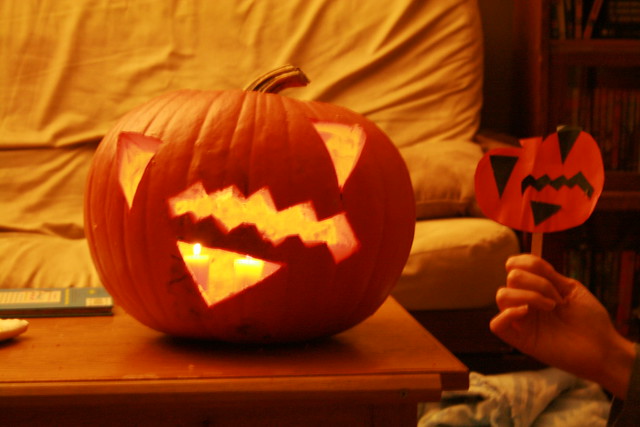
Really good job, don't you think?
ECDC has a parade every year, where the kids wear their costumes and walk across campus:
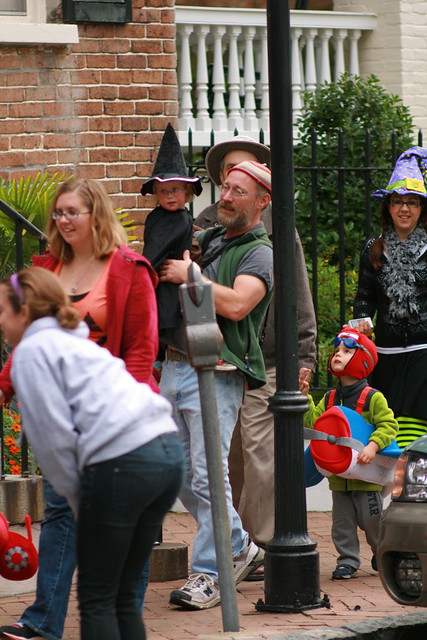
The parade ends on the Cistern, where Maybelle and lots of other kids ran frenetically around rather than standing still and singing the song they'd planned to sing.
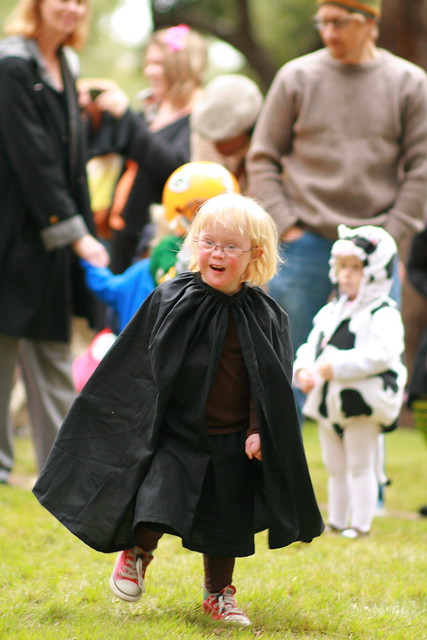
Then Halloween night, we participated in the Halloween tradition we've done since Maybelle was two months old: the party at my friend Lynne's house and subsequent trick or treating throng. This year Maybelle participated even more fully in the trick or treating. She went up to people's porches and said "Trick or treat," and then when they offered her candy, she said, "No bee-tyou" (no thank you). She doesn't like candy.
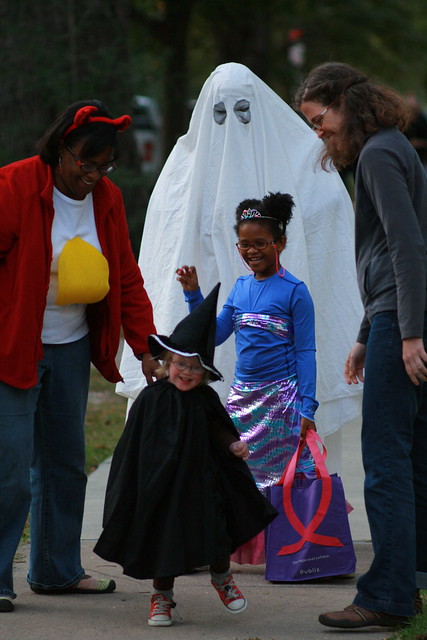
Getting to fully enjoy Halloween with Maybelle and my friends was a surprisingly big deal for me. The day felt so special--seeing her in her witch costume (thanks, Nonnie, for making such a great cape and skirt!), seeing her admire the pumpkin, have fun in the parade, give a try to trick or treating--these were surprisingly important moments. I had this sense of, Oh, yes, this is what I want in my life.
I have other things I might share--thoughts on the conference I attended, thoughts on the fabulousness of the College of Charleston's REACH Program (we actually are, I think, the best in the nation)--but rather than take this post off-track with academic musings, I'll end with the other big news from our household.
Gabe
The SPCA was having a big adoptathon today, and we went and adopted a one year old Great American Black Dog named Gabe.
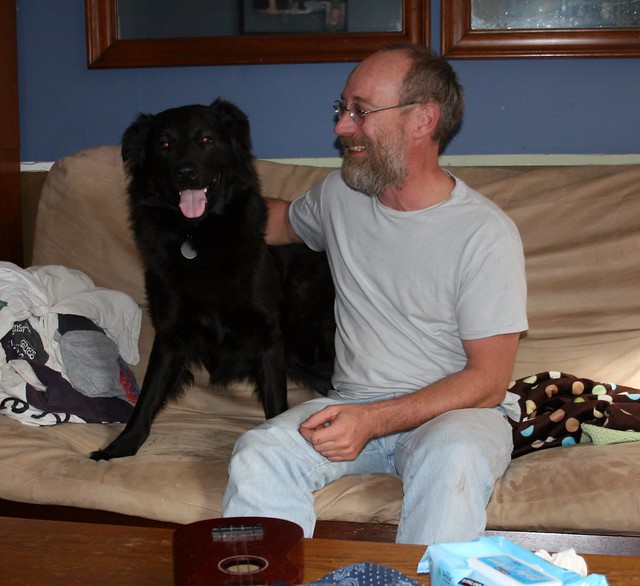
I have now known Gabe for four hours, and here's what I'd like to say:
- He has such a sweet face. That was one of the big things that got to us.
- He is quiet. In the four hours I've known him, he's barked once--and that was playfully, at George Jones. When he was in the adoptathon tent, 50 dogs were barking, squealing, howling, screaming, and he didn't say a word. Sirens went by our house this afternoon, and he looked up attentively but didn't break into a howl like some dogs do. A guy jogged by, and Gabe watched, his body poised for action, but he didn't bark. We'll have to see what he does when the school kids walk by (that was when Benya would let loose with bloodcurdling barks).
- It is a wonderful thing to have a dog in the house. Gabe is checking things out, clicking up and down the hallway, monitoring the front door thoughtfully, sniffing here and there, and it's incredibly comforting. It's comforting for a few reasons--because of safety (I love that attentive dog body that says, Don't even try to mess with this household) and also because of...what...the presence of another person? As I sat down to blog, he lay on the floor beside me, and he looked up at me just now while I was pondering what to write. I can stroke his face and get some pure affection. I really like having him here.
- Maybelle is waking up from her nap, and Gabe is letting me know that he heard some noise from the front of the house (i.e. Maybelle), so I'll sign off.
10.29.2011
Going to the fair
Here Maybelle was at her very first fair in 2009.
You'll notice that at this fair, she was actually eating funnel cakes, which she refused to do today. She is now rejecting the food of her people.
As for 2010:
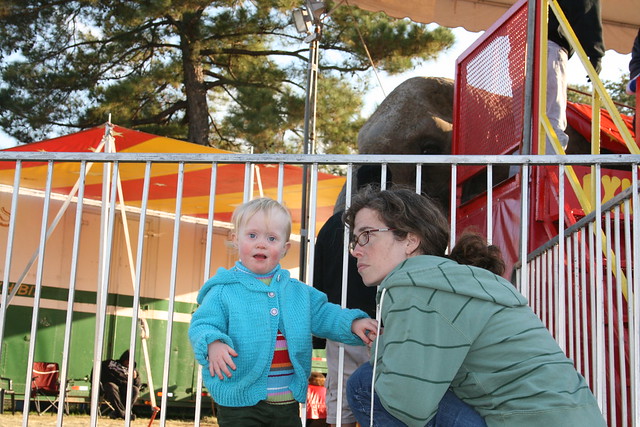
This picture captures much of what last year's fair was like for her: vaguely terrifying. Livestock? Terrifying. Elephants? Terrifying. Rides like the merry go round? Definitively terrifying.
Today we went to the 2011 Coastal Carolina Fair. We returned to our previous Charleston tradition and went to the fair with Claire, Adam, and Nina. It was a great day!
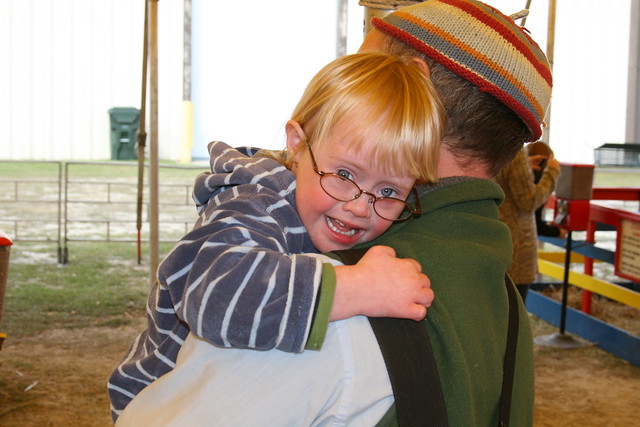
You can see from this picture that Maybelle was still terrified of all things animal, but the this year the terror wasn't as lasting. It did make us wonder, though: is Maybelle such an urban baby that the lights and sounds of the midway don't frighten her, but the quiet organic experience of being around animals does?
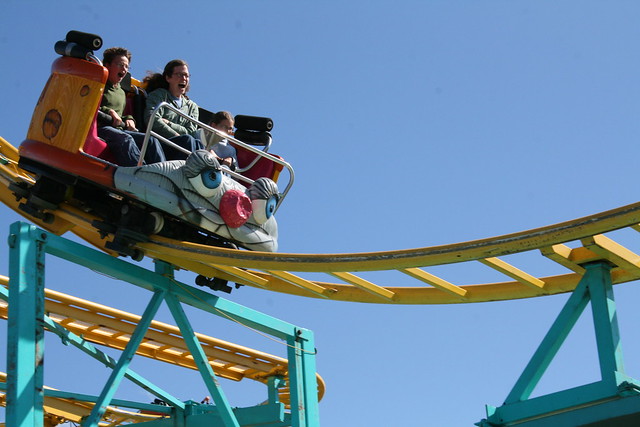
Because Adam, Nina, and Claire were there, Biffle and I both got to go on some adult rides. This is the first roller coaster I've been on in years, and it was such fun! I'm glad I warned Nina ahead of time that I'm a screamer, because boy, was I.
But perhaps the most exciting part was that this year, Maybelle was an enthusiastic rider on two rides: the bumblebee, and the dinosaur. She didn't like waiting in lines, but as soon as the ride started moving, Biffle said she knew what was going on, and she was having a good time.
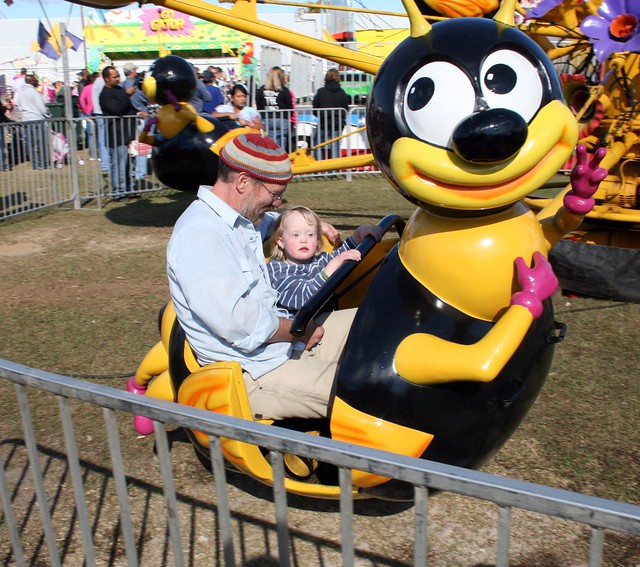
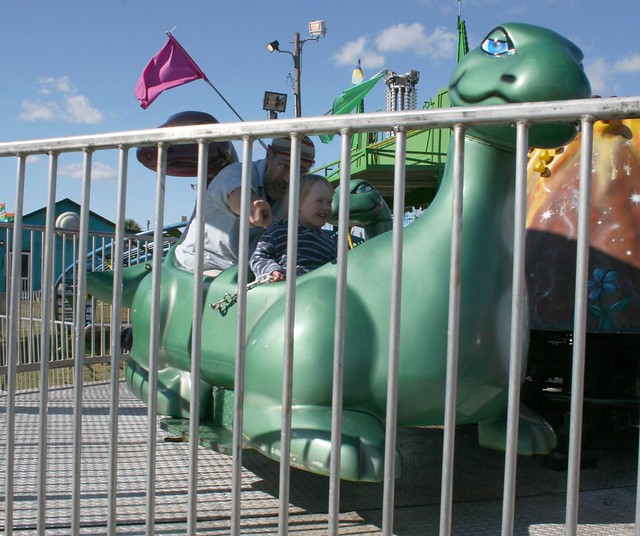
Today really felt like an adventure. I personally love love love the fair: I love the chaos, all the different smells and sights, the weird mix of people, the rides, and most of all, the food. This is why Maybelle has gone to the fair three times in the three years that she's been alive. It was great to see her enjoy today. While the livestock were a bit much for her, she loved looking at various flags waving, she pointed out the helicopter every time it went by, and she jumped on every metal frame covering the wiring in the midway. She and Biffle watched rides going up! and down! And then she had fun on the rides. As we were walking back to our car, Biffle said to Maybelle, "We rode on the bumblebee!", and she added, "Dinosaur!"
I wondered if it would be tricky to have two groups with such different agendas and paces. Maybelle's pace was, let's just say, leisurely. But it worked out beautifully. We split into different groups a couple of different times, and then reunited for animal observations, food, and watching Maybelle on her first successful ride. And Biffle rightly noted that part of the reason the day was such fun is that Adam and Nina are incredibly easy to be around. Rest assured that not every soon-to-be-eleven-year-old is as eager to hang out with Maybelle--to hold her hand, to talk with her, to walk slowly because she's walking slowly--as Adam and Nina. They were great.

10.27.2011
MaterniT21
This week, a drug company called Sequenom has made their prenatal blood test, MaterniT21, available in select markets. This is the test I made reference to in a post or two over the summer: it's the test that can examine fetal DNA from a maternal blood sample. What this means is that it can provide the information that, until now, could only be gotten from amniocentesis or CVS, and these are tests that carry a risk of miscarriage.
Well, I say it can provide the information that an amnio or CVS provides. These are tests that examine fetal genetics for a wide range of things. MaterniT21 looks for one thing, and one thing only: Down syndrome.
Amber Cantrell and I have interviewed quite a few women as part of an extended research project. Those who've chosen not to have an amnio or a CVS have said this was because of the risk of miscarriage. A maternal blood test carries no risk of miscarriage, and it can be done quite a bit earlier in the pregnancy than an amniocentesis. Earlier in the pregnancy matters because 90% of people who discover through testing that their fetus has Down syndrome decide to terminate the pregnancy. If you can learn that your fetus has Down syndrome earlier in the pregnancy, abortion is safer and easier.
As you all know, I am a big advocate of reproductive rights, so this isn't a post saying that folks shouldn't have abortions. It's a post saying that I'm interested in seeing how this new technology affects our conversations about parenthood and disability. We're a culture that often lets technology--rather than thoughtful ethical conversations, for instance--take the lead. So where will this technology lead us? What will it mean for the decision-making processes of women who are pregnant? What will it mean for people, like my daughter, who have Down syndrome?
Cross-posted at Girl w/Pen.
10.26.2011
Things I love about teaching
Yesterday my students were all required to write responses to a very dense (but interesting! and important!) set of readings about gender and violence. One of my students made this mobile.
As you can see below, the shapes all had (good) quotes from the readings on them. I'm not really sure how (in an artistic sense) Martha Mahoney and Kimberle Crenshaw's essays related to a mobile, but I love having students who are willing to be creative in engaging with our course material.
And now we have more funky art for our office.
Things I love about the morning
2. The quiet before the day really begins. That's what time it is right now: I check emails, cruise around my friends' blogs, read my Google alerts about prenatal testing and Down syndrome, think about things with no schedule in mind.
3. Snuggle time. These days, Maybelle really loves the first 15 minutes of the morning to be in the rocking chair. I'll get her out of bed, and she'll say, "I to rock." So we sit in the rocking chair, she snuggles up, and we rock.
4. I actually really enjoy Maybelle's musical pickiness. While we're rocking, I'm supposed to be singing to her, but she is incredibly opinionated. I'll start up with "Jelly Man Kelly," and she'll say, "No." Then I'll launch into "Bingo": "No." "Only the Good Die Young?" "No." One morning she had me sing TMBG's "James K. Polk" three times.
Maybelle is now calling out from her bedroom, so I'll go and enter into two of my favorite morning things.
10.24.2011
8 of 21: Just Dance Kids
I've done some of this Wii dancing and singing stuff before. Catherine and I had a solid evening of the Wii Michael Jackson game a few months ago, and it was strangely hilarious and fun. The Just Dance Kids captured that hilarity and fun for the younger crowd.
This video game allowed you to select songs, from songs that are perfectly pitched to the toddler crowd--the Wiggles' "Hot Potato"!--to those that are perfectly pitched to their moms--Toni Basil's "Hey Mickey"! For each song, there are kids dancing, and the dance moves by and large are simple and repeated. If you're actually playing the game for a score, you hold the Wii thingy as you wave your arms around, but if--like Maybelle--you're just dancing for the joy of it, you can march up to the tv, study the moves and emulate them, then turn around and emulate the other people who are dancing, and sing along with the songs you know.
Maybelle enjoyed it so much that she danced intently through "Hey, Mickey," "Happy and You Know It," "Hot Potato," and a couple of songs I didn't know that Francis picked out. I finally had to hold Maybelle for "The Macarena," but until that one came on, she was dancing completely on her own.
She had so much fun that this might be what she's getting for Christmas. She does love to dance.
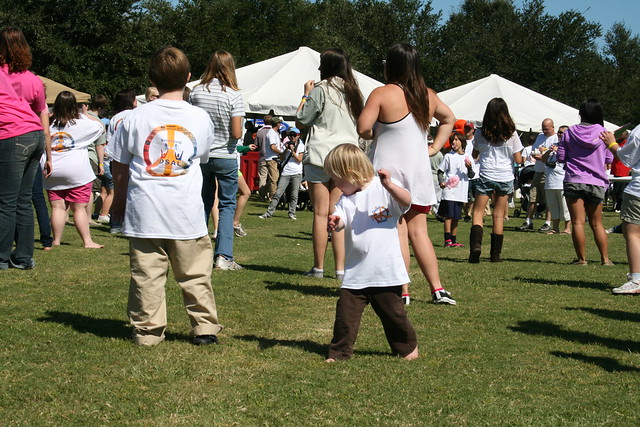
10.23.2011
7 for 21: The poo story
Shortly after we got back home, Catherine heard Maybelle talking cheerfully to herself, so I went into her bedroom to give her the "Maybelle, it's time to go to bed!" stern speech. As I opened her door, a wave of smell washed over me. She cheerfully said, "Good morning!" to me, and I said, "We need to change your diaper."
And then I picked her up out of the bed, and realized that her back was warm and moist. And when I brought her into our bedroom, where the light was on, I saw that her little hand was brown. Something exciting had happened in bed, and she'd done some exploring
Catherine had to strip the bed, banish the stuffed animals, and confirm that the mattress cover had done its job. I had to take Maybelle to the shower--it was that bad. I scrubbed, and scrubbed again: "Let's wash your hands one more time!" Fortunately, Maybelle was very happy with the shower, and after she was cleaned, she was content to read Goodnight Moon and head to bed again where, her digestive system completely empty, she slept soundly.
I know others have far more dramatic stories than this one, but this was the most dramatic poo incident we've had in our household. I'm not sure exactly what to do with some of the animals (how do you de-poo a handmade sheep?), but we made it through, and I'm hopeful that tonight will have no exciting incidents at all.
10.22.2011
6 for 21
But here is a happy post about Catherine's visit to Charleston this weekend. You can see what a good time Maybelle and Catherine consistently have together. Maybelle hasn't seen Catherine since August but immediately knew who she was and has been very happy to see her (perhaps she's also picking up on my vibe about Catherine being here).
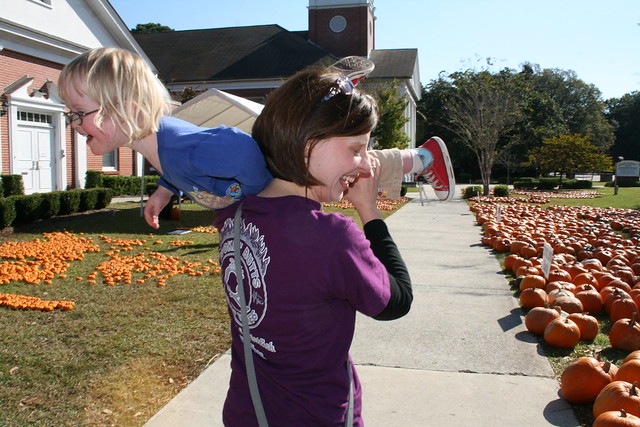 |
| Hauling a happy Maybelle around the pumpkin patch |
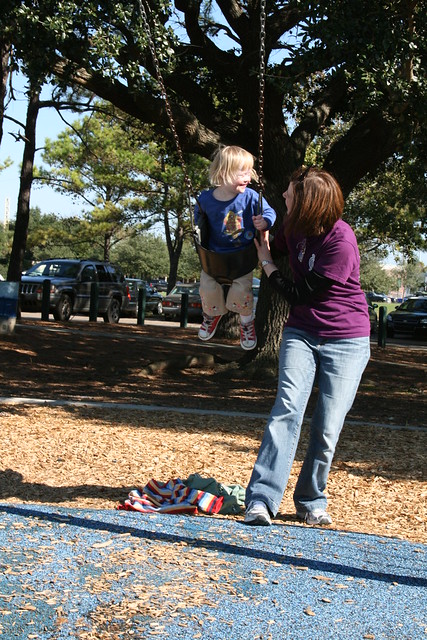 |
| Swinging at the playground |
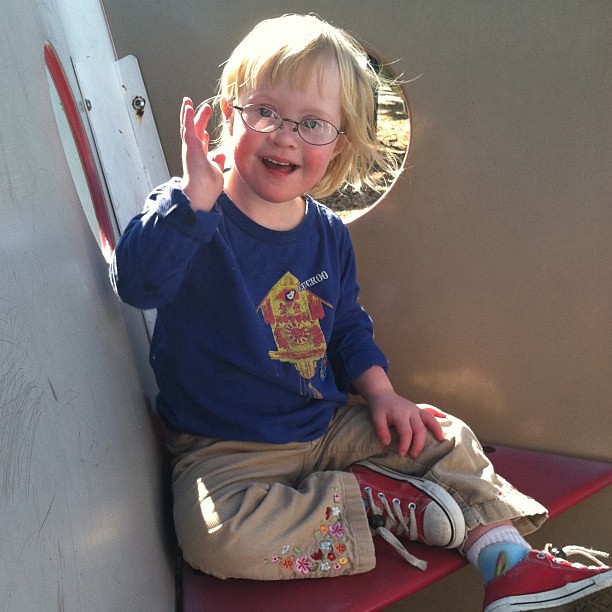 |
| This is just a picture that shows how damn cute Maybelle is. |
Catherine is a speech therapist, and in that professional role, she taught Maybelle the phrase "Ta dah!" today.
10.20.2011
Killing the Black Body
Yesterday I read a book called Killing the Black Body: Race, Reproduction, and the Meaning of Liberty, a scholarly study from 1997 by Dorothy Roberts. It's a book I should have read long ago, for a number of reasons. First of all, it's incredibly important and often cited. But I didn't realize that there were even more personal reasons I should have read it.
Here's how it starts:
In 1989, officials in Charleston, South Carolina, initiated a policy of arresting pregnant women whose prenatal tests revealed they were smoking crack. In some cases, a team of police tracked down expectant mothers in the city's poorest neighborhoods. In others, officers invaded the maternity ward to haul away patients in handcuffs and leg irons, hours after giving birth. One woman spent the final weeks of pregnancy detained in a dingy cell in the Charleston County Jail. When she went into labor, she was transported in chairs to the hospital, and remained shackled to the bed during the entire delivery. All but one of the four dozen women arrested for prenatal crimes in Charleston were Black.
You know that when you're reading a book called Killing the Black Body, and it starts in the place where you live, that this is a bad, bad sign.
I knew a bit about this horrifying practice, because I would talk about it in my Women's Studies classes at Vanderbilt. I'd talk about how racism affects reproductive rights, about the ways that racism and sexism intersect, and about how racism and sexism help to create policies that are actually bad for everybody. I learned a bit more about it once I came to Charleston: I learned that one of the women whose path crosses mine again and again, Susan Dunn, was one of the attorneys who helped bring this case before the US Supreme Court and get this practice to be recognized as unconstitutional.
What I didn't know until I read Roberts' book is that the Medical University of South Carolina, MUSC, enthusiastically helped to make this racist, sexist policy happen. In fact, it was their idea. This makes me sick to my stomach for a number of reasons:
- I gave birth to my daughter there. (And I have some stories from that experience that will give you a sense of how they approach patients depending on the class stereotypes they're projecting onto them. Perhaps I'll blog about some of that at some point.)
- I've had MRI after MRI there.
- Maybelle's wonderful speech therapist is there, so we visit an MUSC office once a week.
- Any other medical care Maybelle needs--like hearing and vision tests--we have performed there.
- Biffle has gotten ER care from them on multiple occasions.
- I have good friends who've completed their degrees there.
I'm going to go email my friends who work at MUSC, as well as Susan Dunn, and find out if MUSC has gone through some sort of serious soul-searching process and made amends for being part of a practice that shat upon black women and their children.
Internet and Flantor the Peno
For the last couple of days, we haven't had internet at our house. Our cable modem has failed us, and despite the fact that our neighborhood is increasingly full of college students, none of them have unsecured wireless internet that we can glom onto. We're very hopeful that this will be fixed by tomorrow.
I have some posts I've been working on, and I'll probably post something in just a few minutes, since I'm at work, where there's plenty of internet. But in the meantime, enjoy this picture sent by my brother Trey, commemorating an incomprehensible--and yet brilliant and hilarious--joke by my brother Aaron. Please note the shout-out at the bottom: "Scridge one up for the Gridge." Wow, were we an odd bunch.
10.15.2011
Reasons why feminism is a good prerequisite for having a child with Down syndrome
At any rate, one of the things that struck me while I was reading is that I didn't have the same year-long struggle that many folks have to adjust to having a child with Down syndrome, and at least one component of why I didn't have to struggle that much is the fact that I was already a feminist when Maybelle came along.
So, reasons why feminism is a good prerequisite for having a child with Down syndrome:
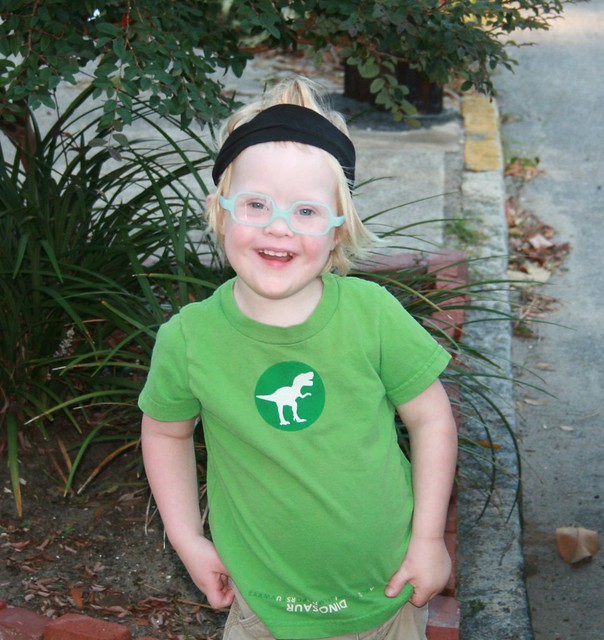 Beauty standards: I'm already quite skeptical of them. I want Maybelle to have her own, unique beauty, like so many of my students do. I want her to look funky, distinctive--not to fit into the homogenous, stereotypically girlish mode. Please see the picture on the left for an example of Maybelle's awesome looks. I love all the ways that she's visually distinctive.
Beauty standards: I'm already quite skeptical of them. I want Maybelle to have her own, unique beauty, like so many of my students do. I want her to look funky, distinctive--not to fit into the homogenous, stereotypically girlish mode. Please see the picture on the left for an example of Maybelle's awesome looks. I love all the ways that she's visually distinctive.Activism: It's not that I want Maybelle's life to have additional challenges, but long before she was born, or even conceived, I knew that she was going to be an ethical person in a fucked up world. What this means is that I'd always envisioned her as an activist, because activism is a necessary component of ethical humanity. So she'll have some easy targets. And we already have tools.
Recognition of social construction: As you're all well aware, I'm into the social construction of everything. Before Maybelle was born I already had a scaffolding in my head of societal oppressions and how they operate. Adding one new concept into this framework--the notion that disability is socially constructed, and that these social constructions can and should be changed--wasn't a paradigm shift. It made perfect sense almost immediately.
What this means is that it was pretty easy for me to see Down syndrome as embraceable human diversity, not a problem, a flaw, a defect, not something to freak out about or want to "solve." It's a component of who Maybelle is, a component that's embraceable. All the bad beliefs and energy about Down syndrome are socially constructed.
Ready-made community: Certainly our friends and families were pretty much, "Down syndrome? Whatever--it's Maybelle!" But the larger feminist community--my students, for instance--only needed the tiniest bit of coaching (like I did) to see things from a feminist disability studies perspective, and now they're all over it. They see Maybelle and there's not a bit of weirdness.
*This wasn't George Estreich's The Shape of the Eye, which I'll review here very soon.
10.13.2011
Oct. 13, 1991
Twenty years ago tonight, I was strolling through the University Center at Tennessee Tech with my friend Jennifer. Two guys we knew walked up, wearing very nice suits. They looked good. Jennifer already had the hots for one of the guys. The other one was a guy I'd seen on campus a lot, and been sort of curious about. Curious, but skeptical: he seemed like trouble, like a slacker, someone who played a lot of music on the patio at Tech and didn't actually go to class.
But he had an energy, a vibe, that I found intriguing. His whole presence seemed to sort of vibrate with it. He looked damn good in a suit. And he was eyeing me like, "Hey, baby."
In fact, he probably said, "Hey, baby."
They invited us to go to one of the few restaurants open in Cookeville, TN, late at night: Waffle House (of course I had no idea then what significance this restaurant would have for me twenty years later). Jennifer and I thought, What the hell. Actually, I suspect that Jennifer though, OMG, I'm going to get to hang out with Wilhelm! I know that I thought, What the hell. I've got nothing better to do tonight. And this guy is really attractive.
At the Waffle House we ordered some coffee, and the Waffle House meal I always got those days: one piece of raisin toast, and a poached egg (really? Yes, that's the kind of thing I ate back then). And then we made out. In the booth at the Waffle House. Jennifer and Wilhelm went at it, and I looked at the guy sitting beside me and thought, again, What the hell?
As it turns out, we weren't all that skilled at kissing each other. Even today, kissing isn't our strong suit. But we were very, very interested in getting to know each other better. I was the super rule following emphatically feminist good girl. He was the guy who challenged all rules on general principle and wanted to explore all the forbidden spaces. It was a terrible idea for us to get together. Really, who would have thought that this could work out?
And as of today, we've been together for twenty years.
Happy anniversary, Biffle!
A quick post from on the road
Special shout-outs to:
- Amy Mecklenburg-Faenger for being an outstanding scholar who helped me accidentally discover some of the historical feminist predecessors to zines.
- Heather Trahan for having a great post-lecture conversation with me in line at the noodle shop, and in our walk back to the hotel.
- Nina Krasnoff and Cate McCann for letting me show off their fabulous informal publications to a crowd of very receptive scholars.
- Cate Bush for taking a totally last-minute picture of the publication she and I produced as girls, The North Dixien, so that I could include it in my powerpoint (damn, were we adorable).
- Kirsti Cole for putting on a great conference, inviting me to speak, and then having some of the exact same questions/frustrations with social change that I'm having right now. So we're going to keep talking.






